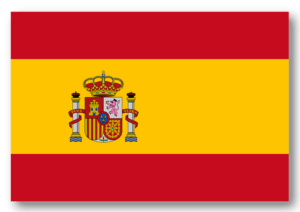Welcome to the homepage of the vocational school of the district of Stormarn in Bad Oldesloe.
At this point we would like to give you an impression of the various activities and the self-conception of our school as an educational service provider in the region of Nordstormarn.
We see our school not only as a place for imparting knowledge, but also as a counselling and support facility. On the one hand, this means that we see it as our duty to support our pupils in many different ways to achieve the qualifications and degrees they are striving for. In addition to a large number of specialist teachers, we also have a large number of support and counselling teachers as well as staff members for socio-pedagogical support available to us to cope with this task.
On the other hand, however, we also endeavour to meet the needs of the regional economy as well as the needs of the citizens in the towns and communities of the district by adapting existing education and training courses and establishing new ones.
Many more details about our education and training work can be found on this homepage. We would also be happy to provide you with further information in person.
Kai Aagardt
Headmaster
Projects
Get out of the box – German-Polish-Israeli preparatory seminar in Bad Oldesloe for future student encounters inspired everybody
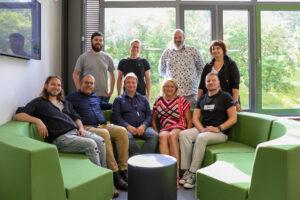
front lane, left: David Brook, Tomer Dahari, Schulleiter Kai Aagardt, Claudia Schecker, Jacek Andrzejewski back lane, left: Alexander Schmitt, Malte Stobbe, Daniel Werstat, Anna Andrzejewska
(erh/reA) Jerusalem – Gdynia – Bad Oldesloe. Three cities, three schools, and one common goal: Establishing a school partnership triangle between Israel, Poland, and Germany.
From 26 to 29 June 2023, two teachers each from a technical college in Jerusalem (Israel) and a partner school for mechatronics/electronics technicians in Gdynia (Poland) met with teachers from the vocational school in Bad Oldesloe to plan and organize future student encounters in a preparatory seminar.
In this seminar the teachers took part in a tight program consisting of getting to know each other, visiting companies in the district of Stormarn, observing other teachers’ lessons, and planning future encounter seminars. This gave rise to the idea of a three-phase encounter with different focal points. However, this project will centre around the physical computing platform “Arduino”. Its aims to solve tasks with digital and analogue sensor technology and later to implement own ideas with the support of a microcontroller. Daniel Werstat, co-organizer and teacher in Bad Oldesloe, shows great enthusiasm about the cooperation: “These project days were accompanied with a positive will from all partners’ sides, so that the agreement on our project’s content was reached quickly. Based on this agreement, we have already started planning the program for our first meeting in Berlin. The fact that we all have a common goal in mind certainly contributed to this. On a personal level: Superb!” Claudia Schecker, team spokesperson for the European School and main organiser of the preparatory seminar, can only agree with this. Driven by strong commitment, the teachers for electrical engineering, IT/media design, and mechatronics Thomas Bernhardt, Alexander Schmitt and Malte Stobbe completed the organisational team from Bad Oldesloe.
On 26 November 2023, 60 students and ten teachers from all three countries will meet in Berlin for the first time. The first project phase will last eight days and will kick off with working in international groups. Besides getting to know each other and working on the project’s content, the guest from Poland and Israel will have the opportunity to explore the city of Berlin with all its tourist highlights, but also historical memorials. The youth workshop is rounded off by a three-day stay in Bad Oldesloe. During this stay, the international students will be introduced to the vocational school by students from Bad Oldesloe presenting their place of learning to them. This will be followed by the second project phase in Warsaw (Poland) in May 2024. The focus will then be on the implementation process of the project groups’ ideas, while the final project phase is planned for the end of 2024. This final project phase will take place in Israel, where the group results and solution approaches will be presented.
Especially for the Israeli guests, visiting Germany was a great experience, because apart from the cultural differences, the German dual education system also offered new and interesting insights. There was also a round of talks with Dr Regenberg from the employment agency in Bad Oldesloe. A tour of the company "Hako GmbH" in Bad Oldesloe showed the good cooperation between the training companies and the vocational school. A few second-year industrial clerk trainees presented "their" company in an impressive way, which left a lasting impression on the guests.
Tomer Dahari (Israeli teacher for information and communication technology) was also particularly impressed by the technical equipment and the spatial conditions in the vocational school. He pointed out that due to the political situation in Israel, everyday school life is very different compared to school life in Germany: "Our students learn enclosed by fences and our school is protected by guards for security reasons." Even if the schools have little in common at first glance, they all share a commitment to their students to develop them into strong personalities. "Weak lambs will not become strong sheep," goes a Hebrew proverb. In conversation with David Brook (Israeli teacher for electrical engineering), it became clear that many Israeli students only associate Germany and Poland with the events of the Second World War. Therefore, he has high hopes for this project as it can also help "heal the wounds from the past". "We learn about our cultural differences and learn to communicate with each other," added Jacek Andrzejewski (Polish teacher for German).
These four days have marked the first big step towards future understanding, new international connections and possibly created friendships. The warm farewells and smiling faces testified to this. "We all want the same thing, the exchange for our students. While we are all different, we still find common ways to achieve the goal. This is just great", Claudia Schecker summed up the first encounter. Promoting the European idea of looking beyond one's own nose can be achieved by international exchange and encounter projects like this. Tomer Dahari's hope: "Get out of the box!”
Visitors from Poland at the vocational high school in Bad Oldesloe
Musical collaboration – “with you and with me”
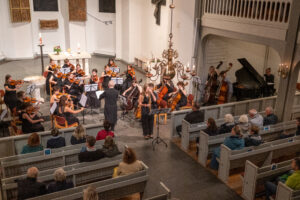 „With you and with me. U mnie i u ciebie. Local youth exchange.“ Following this motto the second part of the exchange project for the German-Polish Youth Award 2021-2023 took place from the 19th until the 24th September 2022 at the vocational school in Bad Oldesloe. This exchange project was initiated by the German-Polish Youth Foundation. As part of this two-phased competition project the students from the ITG20 (graduating class of the vocational high school, specializing in IT and media design) were already guests at Poznańska Ogólnokształcaca Szkoła Muzyczna, the music high school in the Polish town of Poznań in May this year. “The aim of this competition and its project outcome is to create value for the local communities by raising awareness and interest of young people for their local environment”, explained Claudia Schecker, European coordinator for the vocational school in Bad Oldesloe. Following the motto “about the place, for the place, with the place”, the students from both schools were challenged to creatively depict the districts, villages, cities, and counties in their local areas. The participating students from the schools in both towns created German-Polish music guides under the project name “Our favourite places in Poznań and Bad Oldesloe - a digital travel guide”. In this guide the students presented their favourite places in and around the two towns in short videos. These videos are still accompanied by music which was recorded by the chamber orchestra of the Polish music high school. “This is what makes this project so special: The collaboration of two expert classes! On the one hand, there is the concentrated expertise in the field of media design by the students from Bad Oldesloe, while on the other hand the students from Poznań excited us with their musical creativity and virtuosity”, emphasizes Nicole Lange, class teacher of the ITG20. Her specialist colleague for design technology Jennifer Ahrns adds: “It truly was a great challenge which was brilliantly mastered by all students involved.”
„With you and with me. U mnie i u ciebie. Local youth exchange.“ Following this motto the second part of the exchange project for the German-Polish Youth Award 2021-2023 took place from the 19th until the 24th September 2022 at the vocational school in Bad Oldesloe. This exchange project was initiated by the German-Polish Youth Foundation. As part of this two-phased competition project the students from the ITG20 (graduating class of the vocational high school, specializing in IT and media design) were already guests at Poznańska Ogólnokształcaca Szkoła Muzyczna, the music high school in the Polish town of Poznań in May this year. “The aim of this competition and its project outcome is to create value for the local communities by raising awareness and interest of young people for their local environment”, explained Claudia Schecker, European coordinator for the vocational school in Bad Oldesloe. Following the motto “about the place, for the place, with the place”, the students from both schools were challenged to creatively depict the districts, villages, cities, and counties in their local areas. The participating students from the schools in both towns created German-Polish music guides under the project name “Our favourite places in Poznań and Bad Oldesloe - a digital travel guide”. In this guide the students presented their favourite places in and around the two towns in short videos. These videos are still accompanied by music which was recorded by the chamber orchestra of the Polish music high school. “This is what makes this project so special: The collaboration of two expert classes! On the one hand, there is the concentrated expertise in the field of media design by the students from Bad Oldesloe, while on the other hand the students from Poznań excited us with their musical creativity and virtuosity”, emphasizes Nicole Lange, class teacher of the ITG20. Her specialist colleague for design technology Jennifer Ahrns adds: “It truly was a great challenge which was brilliantly mastered by all students involved.”
In addition to the productive group work, the Polish and German delegations each offered varied social programs for their visitors. This included a visit to the dress rehearsal of the Hamburg Symphony Orchestra at the Laeiszhalle as well as the participation in a workshop at the Poznań Croissant Museum, where the students made the sweet Polish pastry themselves. A special highlight of the exchange in Bad Oldesloe marked the benefit concert of the chamber orchestra of the Poznan music high school, which took place under the motto "Getting closer and closer to jazz" in the Peter-Paul Church for the benefit of Ukraine aid on the 21st September 2022. With the donations that were collected in this concert, the school supports two projects. “In cooperation with our partner school in Odessa in southern-Ukraine, the donations will be given to kindergartens and schools in the rural area around Odessa. The second donation project supports survivors of National Socialist persecution in Ukraine”, explains donation initiator Claudia Schecker. The concert audience was offered a rousing program of modern chamber orchestral music, increasingly influenced by jazz as the evening progressed, by the Poznań chamber orchestra, conducted by Jacek Pawelcak, deputy director of the Poznań music high school.
Both the students of the exchange project and the accompanying teachers described the collaboration with the exchange partners as warm-hearted and harmonious. Even the initial challenge of the language barrier did not cause any problems due to multilingual conversations in German, Polish and English. “I experienced the German-Polish collaboration as challenging but at the same time as a very good experience and I really enjoyed speaking English all the time. Actually, so much that I even started thinking in English after a few days! Since the visit in Poland, I have been in close contact with one of the Polish students and we get to talk regularly”, says student Lina Stoppel, summarizing her experience.
For the ceremonial conclusion of the exchange project, both delegations will represent their joint project results to the jury at the final seminar of the German-Polish Youth Award in Poland in summer 2023. To the great fortune of the participants, the exchange project has laid a foundation for further cooperation between the two schools. So, to sum up the project in one word: Grandiose!
(ReA and Schr, vocational school in Bad Oldesloe)
Joe Biden or Donald Trump?
That was the big question of the "U.S Embassy School Election Project 2020," which is initiated regularly to coincide with the presidential election in the United States. In this project, organized by the U.S. Embassy Berlin and supported by the Berlin educational organization LIFE e.V. and the Institute of English Studies at the Leuphana University of Lüneburg, the participating classes (both German and American school classes took part) were asked to use web materials to predict which party would win this year's U.S. presidential election in an American state assigned to them.
Our 12th grade English Language Proficiency course GG19e participated with their course teacher Anna Krone. They were assigned the state of Colorado, which was looked at on different levels. The group results were presented within the class in creative ways such as fictional news sheets or podcasts.
The election forecast was presented in-class and the GG19e concluded that Colorado would vote Democratic and thus support Joe Biden's candidacy. With this prediction, the students were in line with the prediction of the project team's expert as well as the majority of the other classes who also studied the state of Colorado.
"The students learned a lot about the American electoral system, which is very different from the German system," confirms Anna Krone. On the other hand, they became experts on the concerns of the state of Colorado, which was evident from the authentic results in the final presentations.
But to what extent does the forecast match real voter behavior in Colorado? As it stands now, the counting of electoral votes showed a 63% majority for the Democratic Party of Joe Biden. Thus, the GG19e's prediction was correct, which is a positive confirmation of their work. Well done!
European anthem as a symbol of solidarity
Polish exchange students visit the vocational school in Bad Oldesloe
Our school hosted seven students and two teachers from the Polish music high school Poznanska Ogolnoksztalcaca in Poznan from 11.12.-14.12. 2019. Both schools are united by their enthusiasm for Europe and intercultural exchange. The Polish students brought the product of their European project to Bad Oldesloe. Full of passion, they presented the "Ode to Joy" from the ninth symphony - also known as the European anthem - by Ludwig van Beethoven.
In the overcrowded pedagogical center of the vocational school, everyone was fascinated by the skills of the guests from the very first sounds. The classical music went straight to the heart of the students present. "Amazing voices," Adrian Kästel commented on the two singers. "Such delicate violin sounds," found Justin Burkhardt. The two students from AT19 also got into a conversation with the guests after the concert. The festive finale and goosebump moment of the concert was the joint singing of "Silent Night" by all present, accompanied instrumentally by the Polish students. "One could clearly feel the connection that music creates between people. Now, finally, Christmas feelings arise", Leon Lüdicke from AT19 was happy.
The 13 students of the host class WG18d were very excited when they greeted the Polish young people and their teachers at Bad Oldesloe train station on Wednesday with a waving Polish flag and a welcome banner. Afterwards, the students got to know each other better over lunch and by playing games together. "I am thrilled to see how little fear of contact there is on both sides," commented Claudia Schecker, teacher and organizer of the exchange. German has been the guests' subject for three years, but sometimes English came to the rescue. Laura Bodensiek and Emma Petersen, whose families hosted Polish youngsters, will continue to stay in touch with their guests. There are enough common topics to exchange, added Emma, with whom two guest students stayed.
The Polish visitors also had the opportunity to get to know the school during a tour of the building, which included a visit to the specialized rooms. "There is a great learning atmosphere in the modern rooms," Marta Jarzabek emphasized. Afterwards, they took part in physical education classes together with the host class and played volleyball in mixed teams. After baking pizza together and then going bowling, the highlight of the visit followed on Friday.
Teacher Claudia Schecker and her Polish colleague, and now friend, Isabela Witlewska-Janiak were honored as teachers with European competence at a certification ceremony in Lübeck City Hall. In addition to the award in the audience hall, there was an opportunity during the breaks to exchange ideas and experiences in an exhibition showing a wide variety of European projects. The ceremony was accompanied by further musical performances by the Polish guests. Especially their new German friends from Bad Oldesloe congratulated them with thunderous applause and presented them with small gingerbread hearts as a thank you. A return visit to Poland is already planned for next year. This is how Europe works!
SPANISH-GERMAN - ONLINE PROJECT
"¿ES POSIBLE UNA VIDA CON MENOS PLÁSTICO EN MI CENTRO EDUCATIVO?"
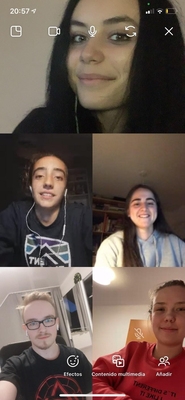 We, 10 students of the advanced Spanish course in the 13th year of the Vocational High School, took part in an eTwinning project from January to May 2021 together with 13 students of the Colegio Diocesano Asunción de Nuestra señora (Spanish secondary school from Ávila - northwest of Madrid). eTwinning offers teachers in European schools a platform to communicate, cooperate, develop projects, exchange ideas and be part of one of the most exciting learning communities in Europe. And these are exactly the goals that our teacher Kerstin Knieriem and her partner on the Spanish side Diego Jiménez Velayos pursued when they launched the project "¿ES POSIBLE UNA VIDA CON MENOS PLÁSTICO EN MI CENTRO EDUCATIVO? -HOW CAN I AVOID PLASTIC WASTE AT MY SCHOOL?" together.
We, 10 students of the advanced Spanish course in the 13th year of the Vocational High School, took part in an eTwinning project from January to May 2021 together with 13 students of the Colegio Diocesano Asunción de Nuestra señora (Spanish secondary school from Ávila - northwest of Madrid). eTwinning offers teachers in European schools a platform to communicate, cooperate, develop projects, exchange ideas and be part of one of the most exciting learning communities in Europe. And these are exactly the goals that our teacher Kerstin Knieriem and her partner on the Spanish side Diego Jiménez Velayos pursued when they launched the project "¿ES POSIBLE UNA VIDA CON MENOS PLÁSTICO EN MI CENTRO EDUCATIVO? -HOW CAN I AVOID PLASTIC WASTE AT MY SCHOOL?" together.
The aim of our project is to improve students' awareness of their plastic consumption in schools and to promote the circular economy in schools by giving a second life to all products made of single-use plastic or by rethinking our consumption habits.
Project process
The first step was to get to know each other. First, the Spaniards and Germans made a video about themselves or created a profile on the Twinspace to introduce themselves to each other. The Twinspace was our working platform, which was used to exchange common documents and also for communication. Afterwards, everyone had the opportunity to meet each other for the first time at the same time in a virtual speed dating in a first video conference via the online tool of the vocational school in Bad Oldesloe Webex and to get to know each other by asking specific questions.
Afterwards, the teachers divided the students into groups. There were 2 to 3 pupils from Bad Oldesloe and 2 to 3 Spaniards in each group. There were four different groups, each working on one aspect of the overall topic. For example, our group (group A) dealt with the "perception of single-use plastic as a problem".
In the groups we exchanged our initial ideas on the topic. Our aim was to come up with questions on the respective topic in the next step. These became part of a common overall questionnaire that was made available to the student body in an online survey. Since only some of the students at our school learn Spanish, we translated all the questions into German.
After evaluating the survey results, each group created a Power Point presentation with corresponding diagrams and presented these to our Spanish students at a second joint "vídeoconferencia". The different results were commented on and discussed in Spanish.
Evaluation of the question: "How do you transport your break meals to school?"
 Based on the survey results, we were now given the task to create a poster in the mixed groups again, on which we list the things that are made of disposable plastic at school (e.g. disposable plastic drinking bottles) and present more sustainable alternatives to them (e.g. drinking bottles made of glass or stainless steel). In another joint video conference, there was a vote in which the best poster was chosen.
Based on the survey results, we were now given the task to create a poster in the mixed groups again, on which we list the things that are made of disposable plastic at school (e.g. disposable plastic drinking bottles) and present more sustainable alternatives to them (e.g. drinking bottles made of glass or stainless steel). In another joint video conference, there was a vote in which the best poster was chosen.
Finally, we were given the task to make a podcast or video in our groups explaining to the school community how we can reduce the use of single-use plastic in school.
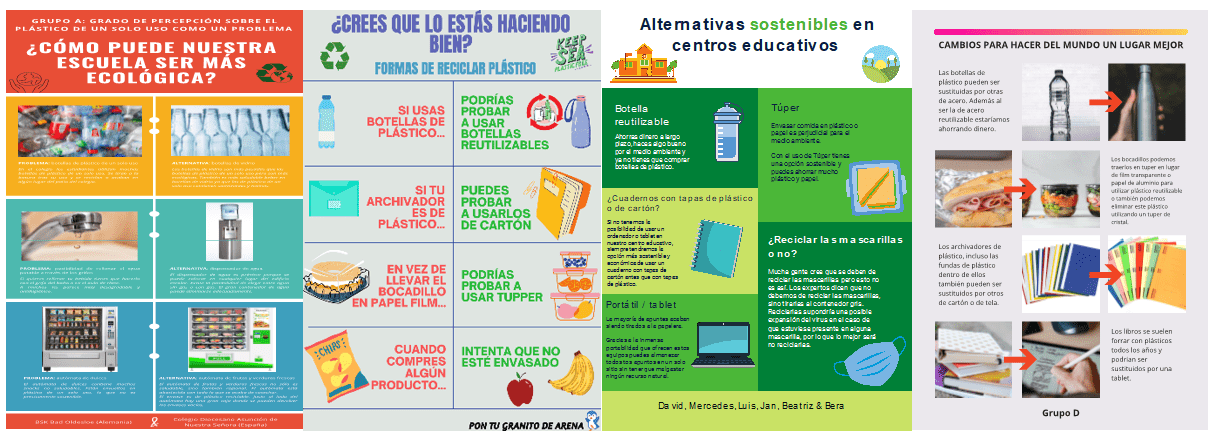
Our results will be presented on the school homepage, the notice board and in the form of an exhibition.
Mission Statement
We promote the future prospects of the students entrusted to us through comprehensive professional qualification.2. We promote the development of personality enabling an independent life in social responsibility.
3. We create a positive learning environment with the help of a culture of tolerance and mutual respect.
4. We meet the ever-changing demands of society and the world of work .
5. We see ourselves as a factor influencing education, the labor market and economics in the region.
6. We contribute to the acceptance and tolerance of other cultures by promoting intercultural competence.
Contact persons for international projects
Kerstin Knieriem

k.knieriem@bs-oldesloe.de
Claudia Schecker


